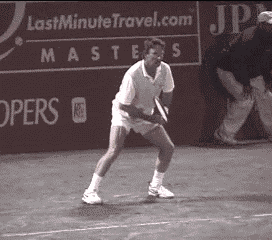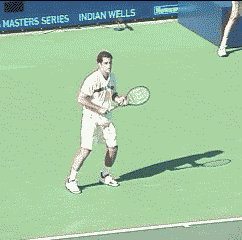|
TennisOne Lessons Training the competitive mind-set Most experts agree that the mental aspect is a huge part of competitive tennis and this becomes clearer the better a tennis player becomes. Consequently, most tennis teachers do not address this part of the game until tournament play becomes a reality. However, my work and studies of competitive juniors and pros suggests that the root of their mental frailty appears early in their athletic life and would be more effectively dealt with if addressed earlier. It is easy to see that players have physical skills to differing degrees. Speed can be measured as can eye-hand coordination and other physical skills such as height, flexibility and the ability to generate power. These physical attributes are relatively easy to recognize. However, what is not so easy to identify, but which exist nonetheless are the mental skills that play a huge role in determining how ‘successful' a player will ultimately be. Certainly, we can recognize those players who are extremely mentally fragile, while there are others who seem to be able to muster up their best tennis at critical times and we call those players mentally tough.
To examine this question further we will have to come to some consensus as to what is the perfect mental state during competition. Most studies on the elusive and enigmatic ‘zone' state in every sport seem to suggest that the perfect mental state is one where the conscious mind (that inner voice that is constantly judging and directing us) is completely silent. It is a state where one is energized, but also relaxed and calm. The problem is that this voice is our ego and to put that aside and play is the most difficult thing to do because the vast majority of players are motivated to play by the ego. If you would like to test your motivation for playing, try this simple test. Ask yourself (and one needs to be brutally honest), why are you playing? In reality, there are only two categories of answers. The first, and if we are really honest this is the category that most of us fall into, we play for something we can gain from the playing. It doesn't really matter what that ‘thing' is, but if the value is extrinsic then we fall into this first category. Those in the second category are not playing for any extrinsic reward, but derive their reward simply from the playing itself. Many people may feel they are in the second category when actually they are in the first. If you are on the borderline, observe yourself when you win and then when you lose (exclude extenuating circumstances like losing to a player who ranks well above you and no one expected you to beat or beating a player everyone expected you to beat). Sometimes the focus is not on the winning and losing, but on how well one played and in that case the criterion rests on how you feel when you played well as opposed to when you played poorly. If those two states of being are exactly the same, then you have arrived! Very few will fall in that category, however the closer those two states of being are, the more mentally tough you are. That having been said, there may be players who clearly fall into the first category and yet are considered mentally tough. These will be the players who have been blessed ‘naturally' with mental skills that most mere mortals lack. These players want to win as much as anyone else and they want to win for all the ‘wrong' reasons and yet come game time, they are able to put everything aside and quiet that inner voice and just play.
For most players this will be very difficult, the desire to win motivated by ego is what feeds that inner voice and when fear and doubt come in, that voice becomes louder and louder and peak performance becomes almost impossible. By the way, fear and doubt are never invited in, but come in through the back door while the desire to win and confidence come through the front door. The truth is that all desire is connected to fear, similarly, confidence and doubt are not two separate things. Trying to project confidence will inevitably lead to doubt, has to! Just look into your life and see. The most successful players are those who have been gifted an abundance of the physical and mental skills by nature and are willing to work extremely hard. However, the purpose of this article is to address those who do not have these natural mental qualities, but wish to acquire them. The answer is simple, they need to fall in love with the game again. Perhaps they were in love with simply hitting the ball at one time, but that is no longer the case now, cannot be, if an active mind is now keeping them from playing their best. It will be necessary to drop all expectations, aspirations and goals and play for no other reason then for joy. Is this an easy task? Absolutely not, but it is the only way. Everything else will be a struggle, which may yield results from time to time, but never for any length of time and the silence will disappear when you most need it. It always amused me when the media and coaches berated Sampras for not playing with more emotion. The fact is that using emotion is a double-edged sword and will inevitably lead to ups and downs. Actually, Sampras was displaying classic signs of a mentally tough competitor, but very few observers were able to recognize this and he himself was given no paradigm, which affirmed that which he was ‘naturally' feeling.
It is a great tribute to him that in the face of all this criticism, he put more stock in himself then all the ‘experts' out there most of the time (I think in the latter part of his career, this changed slightly, much to the delight of the media and ‘fans'). Players themselves must continue to stay focused on having fun on the court and appreciating the joys of hitting, moving and competing and it is essential that parents and coaches help them with this when the players get wrapped up in the rankings and too focused on the winning and losing. The better a player becomes, whether he or she is a junior climbing the sectional or national rankings or a professional aspiring to be the best in the world, the more this applies. To take oneself and one's goals too seriously is to create obstacles that will prevent players being the best they can possibly be. When one plays for ‘fun' (please try and understand how I am using the word. I am not meaning hit and giggle), for intrinsic value, one can become totally absorbed in the activity itself and that is called being present and that can only happen when that inner voice we talked about earlier is completely silent. When this happens, peak performance is bound to follow! Your comments are welcome. Let us know what you think about Happy Bhalla's article by emailing us here at TennisOne. |


